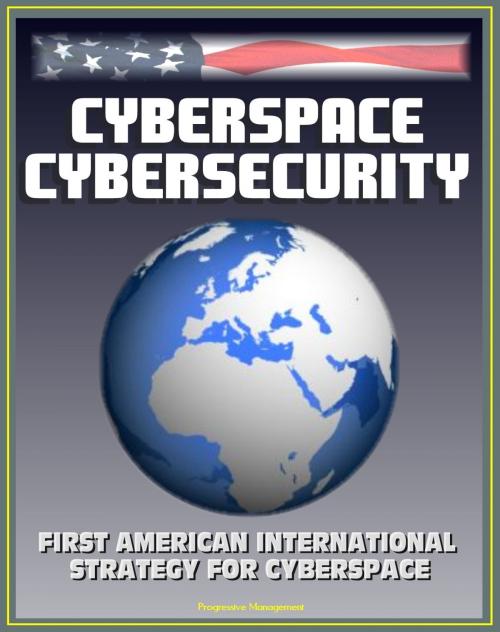Cyberspace Cybersecurity: First American International Strategy for Cyberspace, White House and GAO Reports and Documents, Internet Data Security Protection, International Web Standards
Nonfiction, Computers, Networking & Communications, Computer Security, Operating Systems, Social & Cultural Studies, Political Science| Author: | Progressive Management | ISBN: | 9781458161628 |
| Publisher: | Progressive Management | Publication: | May 18, 2011 |
| Imprint: | Smashwords Edition | Language: | English |
| Author: | Progressive Management |
| ISBN: | 9781458161628 |
| Publisher: | Progressive Management |
| Publication: | May 18, 2011 |
| Imprint: | Smashwords Edition |
| Language: | English |
On May 16, 2011, the White House announced what it called the United States’ first comprehensive International Strategy for Cyberspace. Howard Schmidt, the White House Cybersecurity Coordinator, noted: "The International Strategy is a historic policy document for the 21st Century — one that explains, for audiences at home and abroad, what the U.S. stands for internationally in cyberspace, and how we plan to build prosperity, enhance security, and safeguard openness in our increasingly networked world." This impressive compilation has over 200 pages of official government reports and documents, including the complete White House cyberspace strategy document and supporting materials, plus the Comprehensive National Cybersecurity Initiative, the Cyberspace Policy Review, and a report from the Government Accountability Office - Cyberspace: United States Faces Challenges in Addressing Global Cybersecurity and Governance.
The cyberspace strategy includes: Building Cyberspace Policy * Strategic Approach * Building on Successes * Recognizing the Challenges * Grounded in Principle * Cyberspace’s Future * The Future We Seek * Open and Interoperable: A Cyberspace That Empowers * Secure and Reliable: A Cyberspace That Endures * Stability Through Norms * Our Role in Cyberspace’s Future * Diplomacy: Strengthening Partnerships * Defense: Dissuading and Deterring * Development: Building Prosperity and Security * Policy Priorities * Economy: Promoting International Standards and Innovative, Open Markets * Protecting Our Networks: Enhancing Security, Reliability, and Resiliency * Law Enforcement: Extending Collaboration and the Rule of Law * Military: Preparing for 21st Century Security Challenges * Internet Governance: Promoting Effective and Inclusive Structures * International Development: Building Capacity, Security, and Prosperity * Internet Freedom: Supporting Fundamental Freedoms and Privacy.
Digital infrastructure is increasingly the backbone of prosperous economies, vigorous research communities, strong militaries, transparent governments, and free societies. As never before, information technology is fostering transnational dialogue and facilitating the global flow of goods and services. These social and trade links have become indispensable to our daily lives. Critical life-sustaining infrastructures that deliver electricity and water, control air traffic, and support our financial system all depend on networked information systems. Governments are now able to streamline the provision of essential services through eGovernment initiatives. Social and political movements rely on the Internet to enable new and more expansive forms of organization and action. The reach of networked technology is pervasive and global. For all nations, the underlying digital infrastructure is or will soon become a national asset.
To realize fully the benefits that networked technology promises the world, these systems must function reliably and securely. People must have confidence that data will travel to its destination without disruption. Assuring the free flow of information, the security and privacy of data, and the integrity of the interconnected networks themselves are all essential to American and global economic prosperity, security, and the promotion of universal rights.
Almost a third of the world’s population uses the Internet and countless more are touched by it in their daily lives. There are more than four billion digital wireless devices in the world today. Scarcely a half-century ago, that number was zero. We live in a rare historical moment with an opportunity to build on cyberspace’s successes and help secure its future for U.S. citizens and the global community.
This is a privately authored news service and educational publication of Progressive Management.
On May 16, 2011, the White House announced what it called the United States’ first comprehensive International Strategy for Cyberspace. Howard Schmidt, the White House Cybersecurity Coordinator, noted: "The International Strategy is a historic policy document for the 21st Century — one that explains, for audiences at home and abroad, what the U.S. stands for internationally in cyberspace, and how we plan to build prosperity, enhance security, and safeguard openness in our increasingly networked world." This impressive compilation has over 200 pages of official government reports and documents, including the complete White House cyberspace strategy document and supporting materials, plus the Comprehensive National Cybersecurity Initiative, the Cyberspace Policy Review, and a report from the Government Accountability Office - Cyberspace: United States Faces Challenges in Addressing Global Cybersecurity and Governance.
The cyberspace strategy includes: Building Cyberspace Policy * Strategic Approach * Building on Successes * Recognizing the Challenges * Grounded in Principle * Cyberspace’s Future * The Future We Seek * Open and Interoperable: A Cyberspace That Empowers * Secure and Reliable: A Cyberspace That Endures * Stability Through Norms * Our Role in Cyberspace’s Future * Diplomacy: Strengthening Partnerships * Defense: Dissuading and Deterring * Development: Building Prosperity and Security * Policy Priorities * Economy: Promoting International Standards and Innovative, Open Markets * Protecting Our Networks: Enhancing Security, Reliability, and Resiliency * Law Enforcement: Extending Collaboration and the Rule of Law * Military: Preparing for 21st Century Security Challenges * Internet Governance: Promoting Effective and Inclusive Structures * International Development: Building Capacity, Security, and Prosperity * Internet Freedom: Supporting Fundamental Freedoms and Privacy.
Digital infrastructure is increasingly the backbone of prosperous economies, vigorous research communities, strong militaries, transparent governments, and free societies. As never before, information technology is fostering transnational dialogue and facilitating the global flow of goods and services. These social and trade links have become indispensable to our daily lives. Critical life-sustaining infrastructures that deliver electricity and water, control air traffic, and support our financial system all depend on networked information systems. Governments are now able to streamline the provision of essential services through eGovernment initiatives. Social and political movements rely on the Internet to enable new and more expansive forms of organization and action. The reach of networked technology is pervasive and global. For all nations, the underlying digital infrastructure is or will soon become a national asset.
To realize fully the benefits that networked technology promises the world, these systems must function reliably and securely. People must have confidence that data will travel to its destination without disruption. Assuring the free flow of information, the security and privacy of data, and the integrity of the interconnected networks themselves are all essential to American and global economic prosperity, security, and the promotion of universal rights.
Almost a third of the world’s population uses the Internet and countless more are touched by it in their daily lives. There are more than four billion digital wireless devices in the world today. Scarcely a half-century ago, that number was zero. We live in a rare historical moment with an opportunity to build on cyberspace’s successes and help secure its future for U.S. citizens and the global community.
This is a privately authored news service and educational publication of Progressive Management.















